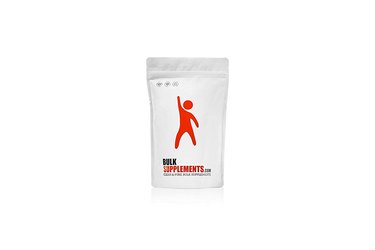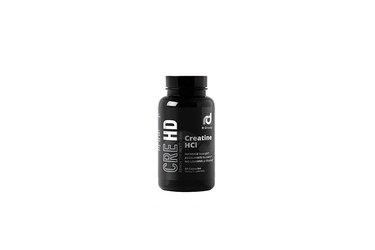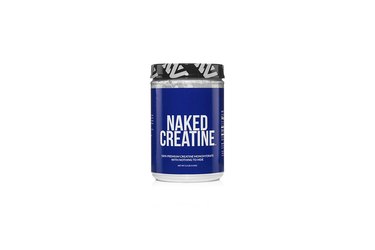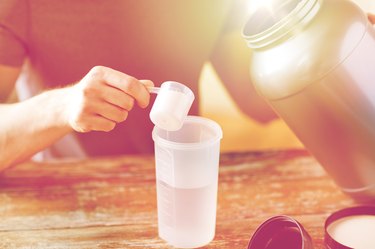
Creatine supplements aren't just for bulky weight lifters who seem to live at the gym. There's actually a surprising amount of research behind this muscle-building supplement, and it may be just the trick (along with a healthy diet and regular exercise, of course) to help you reach your fitness goals.
But the sheer number of brands, varieties and forms of creatine can make choosing a product overwhelming. Before you stock up, let's look at how the supplement can improve your fitness and physique as well as how to choose the best creatine that's right for you.
Video of the Day
Video of the Day
What Is Creatine and How Does It Work?
While creatine is probably best known as a supplement you can buy at your local vitamin store, your body actually makes its own, too. Creatine is an amino acid made in the liver, kidneys and pancreas, according to the Mayo Clinic. It's also found in food, such as seafood and red meat, which is how most carnivores get their creatine on a daily basis. Vegetarians typically get very little creatine in their diets.
When you eat creatine or take a supplement, your body converts the amino acid into a molecule called phosphocreatine, which helps give you energy, or, as experts call it, adenosine triphosphate (ATP), according to the University of Colorado Denver. Without ATP, you couldn't contract your muscles. That bump in your body's phosphocreatine production means more energy and improved performance during exercise.
What Is Creatine Good For?
In supplement form, creatine has been well studied and is thought to offer the best benefits for athletes and exercisers looking to enhance strength and muscle size, according to Robert Wildman, PhD, registered dietitian and creator of The Nutrition Dr.
When combined with creatine in food, the supplement can complement what's naturally produced by your body. In addition to a boost in muscle size, there are several more creatine benefits worth considering, according to a July 2012 report published in the Journal of the International Society of Sports Nutrition , including:
- Improved strength: Taking creatine supplements alongside resistance training has been shown to increase muscle strength, especially during high-intensity exercise like weight lifting, sprinting or jumping.
- Increased endurance: Although creatine is best known for its positive effect on strength training, the supplement may also enhance endurance during cardio exercise.
- Faster recovery: If you're injured, creatine can help offset the natural decline in your body's glucose stores, common after muscle damage, meaning your body can repair itself quicker.
- Sharper cognition: The supplement has also been associated with brain health. Creatine may improve cognitive function in aging adults or anyone who hasn't gotten enough sleep.
- Dehydration prevention: Creatine draws water into the muscles, according to a February 2016 study published in the International Journal of Sports Medicine. While this can result in a little weight gain, according to the International Center for Sports Nutrition, the extra water might fight dehydration and contribute to muscle growth.
How to Take Creatine Safely
Your muscles can only store so much creatine, according to a June 2017 article published in the Journal of the International Society of Sports Nutrition. Average diets contain about 1 to 2 grams of creatine per day; that amount fills your muscle stores to about 60 to 80 percent.
For general health benefits, you'll want to get more like 3 to 5 grams of creatine per day, according to Karen Cooney, certified holistic health coach with the Vitamin Shoppe. While some athletes choose to cycle their creatine, taking higher doses for a short time — up to 5 grams four times per day for five to seven days is safe, according to the Journal of the International Society of Sports Nutrition article — there's no need to do so if you're sticking to 3 to 5 grams daily, Cooney says.
Depending on how much creatine you're getting, it can take 10 to 30 days before you notice any effect on muscle strength, Wildman adds. As a general rule of thumb, it's best to talk to a health professional to decide on the best creatine dose for your body. Different bodies may have different reactions to various amounts.
Although creatine is generally considered safe, there are some potential side effects associated with the supplement. Taking creatine with anti-inflammatory medications, such as ibuprofen and naproxen, may increase the risk of kidney damage, according to the Mayo Clinic.
Often, bottled sports drinks combine creatine and caffeine for a pre-workout boost. While this combination may increase energy, it could also upset your stomach, according to a May 2017 study published in the Journal of Strength and Conditioning. Mixing creatine with caffeine may even diminish the performance benefits of the supplement, according to the Mayo Clinic.
Other possible side effects of creatine include weight gain, muscle cramps, muscle strains or pulls, dizziness or high blood pressure. Like any supplement, creatine is not regulated by the U.S. Food and Drug Administration (FDA) as strictly as prescription medications. That means manufacturers may mislabel or exaggerate the benefits of their products with little repercussion, according to the FDA. Always consult a doctor or registered dietitian who specializes in sports nutrition before taking creatine.
The Different Types of Creatine
Just as whey protein can come in different forms, there are different types of creatine, too.
Creatine monohydrate is made up of a creatine molecule and a water molecule, according to the U.S. National Library of Medicine. Currently, this is the most frequently studied form of creatine, and it's been shown to have the best results in improving strength and exercise performance, according to a June 2017 article published in the Journal of the International Society of Sports Nutrition.
Creatine hydrochloride (HCL) is another popular form of the supplement, known for having better absorption than creatine monohydrate, according to a December 2015 study published in Food and Nutrition Sciences. However, after comparing the effects of the two forms, researchers found no significant difference in the maximum weight the study participants were able to leg press and bench press; both the monohydrate and HCL groups saw improvements in strength with creatine supplementation.
Creatine ethyl ester is a lesser-known form of the supplement, developed to maximize the body's absorption of creatine, according to a February 2009 study published in the Journal of the International Society of Sports Nutrition. However, when compared to creatine monohydrate, this form may not be as effective in improving muscle mass or strength, researchers found.
Micronized or non-micronized creatine refers to minor differences in how the supplement is processed. Micronization changes the shape or size of creatine particles but does not generally alter the effects of the supplement. Micronized creatine does become more easily dissolved in water, according to a November 2010 article published in the Journal of Supercritical Fluids, which cuts back on some of the chalky texture of a creatine shake.
Buffered creatine is allegedly safer and more effective than creatine monohydrate; however, research has not been able to show that buffered creatine promotes higher muscle creatine or improved strength or performance, according to a September 2012 study published in the Journal of the International Society of Sports Nutrition.
Liquid creatine, like buffered creatine, is rumored to have faster absorption in the body than powdered forms. However, research has not shown any advantage of liquid creatine over creatine monohydrate, according to a May 2011 analysis published in Amino Acids.
Creatine magnesium chelate is another lesser-known form of creatine that's combined with magnesium. Although there hasn't been extensive research on creatine magnesium chelate, a May 2004 study published in the Journal of Strength and Conditioning Research found it can increase strength in performance tests, although not any more than standard creatine.
Which Form Is Best for You?
While there are many varieties of creatine supplements on the market, research has not yet shown any form to be superior over creatine monohydrate. When it comes to performance and strength benefits, creatine monohydrate is going to be the most effective gram per gram, Wildman says.
With that said, there are factors that may affect which creatine is best for your lifestyle. Although your body's ability to use creatine is not affected by the micronization process, some people prefer a micronized form, as it mixes more smoothly with liquids. If you plan to mix your creatine with juice or water, micronized may be your best bet. But if you're a smoothie person, micronization probably isn't a necessity.
If you're always on the go, you might prefer a capsule version, as it's easy to swallow a pill anywhere and isn't as messy as powder. Keep in mind that capsules often come with filler ingredients like gelatin or silica, according to Cooney. These additives aren't necessarily bad for your health, but they do add some artificial ingredients to the mix.
The Bottom Line
Creatine monohydrate is the most effective and most researched form of the supplement, and you can decide if you prefer capsules or powder. Consider the foods you plan to combine with your supplements to determine whether a micronized form is necessary.
The 4 Best Creatine Supplements
When choosing your creatine, Wildman cautions to keep an eye on the price. Some forms or brands may cost more than others, but there's no need to shell out for the most expensive product, he says. Stick to reputable brands, as they may be more likely to actually contain what's listed on the label.
Look for a creatine supplement with little to no filler ingredients, advises Cooney. Fillers or binding agents may include gelatin, silica, artificial colors or sweeteners, salt, sugar, wheat, yeast, gluten and dairy, among others.
1. BulkSupplements Creatine Monohydrate
BulkSupplements makes a filler-free creatine monohydrate powder that is a top seller on Amazon. BulkSupplements offers a micronized formula, which dissolves easily in water or a post-workout shake.
Buy it: Amazon.com; Price: $16.11
2. CreHD Creatine HCL Capsules
CreHD promises a bloat-free creatine capsule, formulated for improved endurance and accelerated recovery. Creatine capsules contain less of the amino acid per serving, so they may not cause as much water retention. Anyone who experiences bloating after taking creatine powder might want to opt for the capsule form instead.
Buy it: Amazon.com; Price: $13.99
3. Optimum Nutrition Micronized Creatine Monohydrate Powder
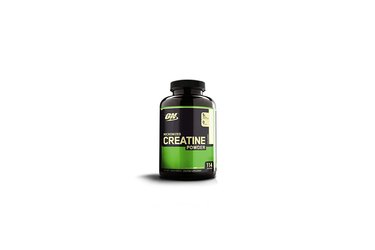
Optimum Nutrition's creatine powder provides a 5-gram serving in just one teaspoon. Optimum Nutrition offers supplement sizes for all budgets and needs, whether you're looking for a 120-gram or 1,200-gram container.
Buy it: Amazon.com; Price: $15.08
4. Naked Nutrition Naked Creatine
Naked Nutrition is known for its filler-free formulas and minimal ingredients lists — creatine powder included. Naked Nutrition's only ingredient is 100 percent pure micronized creatine monohydrate, and the brand claims the powder will dissolve quickly in water and absorb easily in your body.
Buy it: NakedNutrition.com; Price: $41.99
- Mayo Clinic: "Creatine"
- Journal of the International Society of Sports Nutrition: "Creatine supplementation with specific view to exercise/sports performance: an update"
- International Center for Sports Nutrition: "Answers to Your Top 10 Questions About Creatine"
- International Journal of Sports Medicine: "Creatine Supplementation Increases Total Body Water in Soccer Players: a Deuterium Oxide Dilution Study
- FDA: "Caution: Bodybuilding Products Can Be Risky"
- Food and Nutrition Sciences: "Creatine HCl and Creatine Monohydrate Improve Strength but Only Creatine HCl Induced Changes on Body Composition in Recreational Weightlifters"
- Journal of Supercritical Fluids: "Micronization of Creatine Monohydrate via Rapid Expansion of Supercritical Solution (RESS)"
- Journal of the International Society of Sports Nutrition: "International Society of Sports Nutrition position stand: safety and efficacy of creatine supplementation in exercise, sport, and medicine"
- Journal of Strength and Conditioning: "Effects of Coffee and Caffeine Anhydrous Intake During Creatine Loading"
- University of Colorado Denver: "Creatine"
- Journal of the International Society of Sports Nutrition: "The effects of creatine ethyl ester supplementation combined with heavy resistance training on body composition, muscle performance, and serum and muscle creatine levels"
- Amino Acids: "Analysis of the Efficacy, Safety, and Regulatory Status of Novel Forms of Creatine"
- Journal of Strength and Conditioning Research: "Mg2+-Creatine Chelate and a Low-Dose Creatine Supplementation Regimen Improve Exercise Performance"
